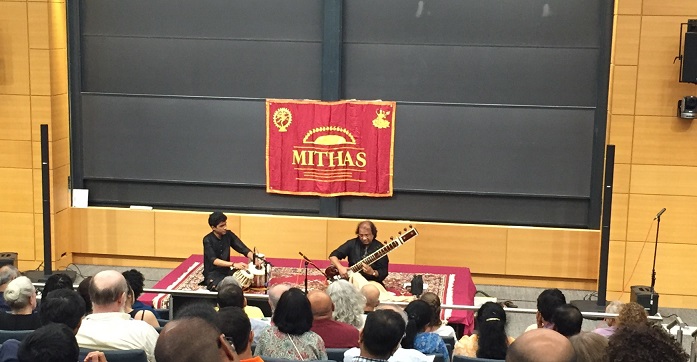Contribute
| Poetry In Motion – Melodious Sitar Recital By Pandit Nayan Ghosh |
Shuchita Rao
06/02/2016
(This article is sponsored by Masala Art)
That Pandit Nayan Ghosh is the bearer of a rich musical legacy was more than evident in his sitar recital on Saturday, May 28 at MIT’s Wong auditorium. There was great grace in Pandit Ghosh’s detailed renditions of the evening/night ragas Shuddh Kalyan and Jhinjhoti. A semi-classical Dadra based on Raga Khamaj provided a pleasant and fitting ending to a two and half hour long concert. The tuneful intensity of the renditions and the beautiful soundscapes painted by the artist’s vivid imagination made a lasting impression on the minds of the listeners. It was a concert devoid of gimmicks and on a personal level, the sweetness of the tone of the sitar as well as the facility and ease with which Pandit Ghosh played the sitar reminded of the music of the legendary sitarist, the late Pandit Nikhil Banerjee. This Hindustani classical sitar concert organized by MITHAS had great attendance.
Pandit Nayan Ghosh was groomed by his father, the late Pandit Nikhil Ghosh not only in the art of playing the sitar and tabla but also in other genres of Indian music such as semi-classical and folk music. For over the past two decades, he has received additional guidance in stringed instrumental compositional structures as well as knowledge on rare ragas from the renowned sarod maestro Pandit Buddhadev Dasgupta.
The concert began at 7pm with a systematic development of Raga Shudh Kalyan primarily in the lower (Mandra) and middle(Madhya) octaves with ample display of the Kalyan ang as well as the liberal use of modulation in order to contrast and accent key musical phrases. The rendition of the madhyalaya and drut teentaal gats displayed dignity in style and ornamental graces were introduced with fine aesthetic judgement. Cascading fast avrohi taans displayed strength and imagination and young son Ishaan’s nuanced tabla accompaniment had hallmarks of maturity far beyond his age. The cheerful demeanor of the artists and their pleasant smiles through the effortless play brought joy to the audience.
Post interval, Pandit Ghosh presented evocative Alaap, Jod and Jhala in raga Jhinjhoti followed by a couple gats, one being an inheritance from the eminent Sarodiya Pandit Buddhadev Das Gupta’s repertoire (handed down to him by his grand Guru Ustad Mohammed Amir Khan) and the other a spontaneous on-the-spot self-created composition at the spur of the moment. The varied permutations of notes, the geometric symmetry of congruent musical phrases, the sometimes understated and sometimes flamboyant play of contrasts, the slow and steady build up from a leisurely rendition of alaap to an elegant and spirited finish made for a dynamic and flowing presentation with tremendous musical appeal.
The concert ended with a semi-classical dadra based on Raga Khamaj. There were several khamaj family ragas that were introduced in a subtle manner during the short but sweet rendition. It was evident that Pandit Nayan Ghosh’s music touched the hearts of the concert attendees who filled the Wong auditorium to near-capacity. After the concert, when attendee Barbara Garczynska shared her feeling “The artist’s music spoke to me!†she summed the sentiment of most listeners including myself, who enjoyed the concert a great deal. Kudos to MITHAS for presenting Pandit Nayan Ghosh on sitar. Next time, the Boston audiences look forward to hearing a tabla solo by the same artist who holds a double distinction in playing the sitar and the tabla.
You may also access this article through our web-site http://www.lokvani.com/

